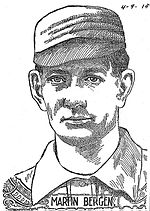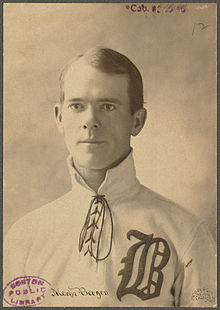- Marty Bergen (baseball)
-
Marty Bergen 
Catcher Born: October 25, 1871
North Brookfield, MassachusettsDied: January 19, 1900 (aged 28)
North Brookfield, MassachusettsBatted: Unknown Threw: Right MLB debut April 17, 1896 for the Boston Beaneaters Last MLB appearance October 15, 1899 for the Boston Beaneaters Career statistics Batting average .265 Hits 339 Runs scored 180 Teams Martin "Marty" Bergen (October 25, 1871 – January 19, 1900) was an American Major League Baseball player from 1896 to 1899. He played in 344 games during his four-year career with the Boston Beaneaters, 337 of them as their catcher. Bergen helped the Beaneaters win two straight National League pennants (1897 and 1898), as well as a second-place finish in 1899.
He was considered a superior defensive catcher, as compared to his contemporaries. A 2001 article about him described him as "a nimble fielder with a bullwhip arm who could snap the ball to second base without so much as moving his feet".[1]
Bergen's career and life ended suddenly, when he killed his wife and two children, then took his own life. Despite this, he received one vote in both 1938 and 1939 to enter the Baseball Hall of Fame.[2]
Contents
Career
Born in North Brookfield, Massachusetts, Bergen attracted attention while playing for a series of teams from 1892-1895. But his behavior was mercurial. Batting .372, Bergen left the Kansas City Blues suddenly in 1895 over a perceived slight, and never again played for the team. Boston had scouted him, and was quick to purchase his contract for $1,000.
Within a year, Bergen had established a reputation for throwing out baserunners. Bergen played in 344 major league games for the Beaneaters teams,[3] who won two straight National League pennants (1897–1898), and finished in 2nd place in 1899.[4] As a catcher, he had mixed results, as exemplified by the 1898 season. On the plus side, he had a Range factor of 5.17 in 1898—well above the league average of 4.60 for catchers. Future Hall of Famer Jesse Burkett enthusiastically described Bergen's skills in 1900: "As a catcher, Martin Bergen was the best the world ever produced. No man acted with more natural grace as a ballplayer. There was finish in every move he made. His eye was always true, and his movements so quick and accurate in throwing that the speediest base runners...never took chances when Bergen was behind the bat."[1] However, Bergen also led the league's catchers with 24 errors and 38 passed balls. He had a career batting average of .258 with 69 extra base hits and 176 RBIs.[3]
Mental woes
Bergen's teammates appreciated his strong arm and hustling style of play, but relations between the catcher and the team soured following an altercation with Vic Willis in which Bergen inexplicably slapped him while eating breakfast. The team's mixed emotions were expressed by a Boston player anonymously quoted in the press: "He has made trouble with a good many of the boys and we just give him a wide berth. But he's a ballplayer, and once we get into a game, personal feelings are set aside in admiration of the artist, for such he is."
Bergen's condition worsened in 1899, which led to internal turmoil for the Beaneaters. He was having hallucinations that enemies were trying to poison him. His son died in April, and Bergen imagined that his teammates were making jokes behind his back about the death. He began sitting in particular positions, and walking sideways, so that he could spot assassins approaching from either side of him. Boston's team president urged the other players to avoid Bergen, fearing what he might do. Some blamed his condition on heavy drink,[5] but Bergen was regarded by others as a teetotaler.
In mid-July 1899, Bergen silently walked off the team's train at the beginning of a road trip, leaving Boston with just a backup catcher during a heated pennant race. However, he was lustily cheered by fans upon his return to the team. In September, Bergen disappeared again for a few days, then showed up unannounced a few minutes before a game and put on his catching gear without speaking to anyone. On October 9, Bergen had to be removed from a game when he dodged the pitches rather than catching them, because he was preoccupied with avoiding knife thrusts from an invisible assailant. Bergen was aware of his mental state, and actively sought help from both clergy and physicians. However, he refused to take any of the bromides prescribed by his doctor, explaining, "I thought someone in the National League had found out that you were my family physician and had arranged to give me some poison. I did not take it from my wife because I didn't wish hers to be the hand that poisoned me."
One book on Boston baseball history recounts that after his son's death, Bergen "would catch a few games, then ask manager Frank Selee if he could return home for a few days."[6] When Selee refused permission, Bergen would go home anyway. Bergen complained that players kept reminding him of his son who had died, and he resented a $300 fine imposed for being AWOL. "Black moods came on Bergen who seemed to be happy only when on his farm in North Brookfield." Several players said they would not return to the Beaneaters in 1900 if the increasingly erratic Bergen was still with the club.[7] There were also reports that Bergen had suffered a career-ending broken hip during a game in the 1899 season.[8][9]
Death
In January 1900, at his home in North Brookfield, Massachusetts, the 28-year-old Bergen ended his life in murder-suicide. Bergen killed his wife and two children with an axe, then used a straight razor to cut his own throat with such force that he nearly beheaded himself. Bergen's father discovered the bodies. According to an article from The New York Times reporting on the tragedy:
The little boy (Bergen's 3-year-old son) was lying on the floor with a large wound in the head. Mrs. Bergen's skull was terribly crushed, having evidently been struck more than one blow by the infuriated husband. The appearance of the little girl (his 6-year-old daughter found on the kitchen floor next to Bergen) also showed that a number of savage blows had been rained upon the top and side of her head. Bergen's throat had been cut with a razor, and the head was nearly severed.[10]
Bergen's behavior had been known to the press, which suppressed much of it. Following his death, they reported that he had been subject to "fits of melancholy" and had "showed signs of insanity" in the fall of 1899.[10] After examining contemporary accounts, the Harvard Medical School's Dr. Carl Salzman felt that Bergen was likely a schizophrenic with possible manic depression.
In 1934, Connie Mack and George M. Cohan, both of whom had ties to Brookfield, helped raise funds to erect a granite memorial to Bergen. The inscription on the monument at Bergen's gravesite at St. Joseph's Cemetery on Bell Street read: "In memory of Martin Bergen, 1871-1900. Member of the Boston National League Club. Erected in appreciation of his contribution to American's national game."[7]
Marty Bergen's brother, Bill Bergen, was a Major League catcher as well, from 1901 to 1911, for the Cincinnati Reds and the Brooklyn Superbas.[11]
References
- ^ a b "Video". CNN. June 4, 2001. http://vault.sportsillustrated.cnn.com/vault/article/magazine/MAG1022658/1/index.htm. Retrieved May 12, 2010.
- ^ Hall of Fame Needs to Get Rid of Character Clause SI.com, February 11, 2009
- ^ a b "Marty Bergen's career statistics". retrosheet.org. http://www.retrosheet.org/boxesetc/B/Pbergm102.htm. Retrieved 2008-09-08.
- ^ "Atlanta Braves (1871-2007)". retrosheet.org. http://www.retrosheet.org/boxesetc/A/FR_ATL.htm. Retrieved 2008-09-08.
- ^ Hall, Alvin L.; Peter M. Rutkoff (2000). The Cooperstown Symposium on Baseball and American Culture. McFarland. pp. 180. ISBN 0786408324. http://books.google.com/books?id=189vXwlGxpgC&pg=PA180&lpg=PA180&dq=%22Marty+Bergen%22+baseball&source=web&ots=w-_puNKJMO&sig=d9np5_fiy7NlzfR-tgiYRdoXdCA&hl=en&sa=X&oi=book_result&resnum=8&ct=result#PPA180,M1. Retrieved 2008-09-08.
- ^ http://books.google.com/books?id=SLF_umn--N4C&pg=PA97&lpg=PA97&dq=%22marty+bergen%22+%22connie+mack%22&source=web&ots=u4OyLrSJsx&sig=5gpZcz8EFxm3n7ZvxMKVgPFZKYE
- ^ a b Kaense, Harold; Warren Spahn, Richard A. Johnson (2004). The Boston Braves, 1871-1953. Northeastern University Press. pp. 97. ISBN 1555536174.
- ^ "Marty Bergen from the Chronology". baseballlibrary.com. http://www.baseballlibrary.com/ballplayers/player.php?name=Marty_Bergen_1871&page=chronology. Retrieved 2008-09-08.
- ^ Connor, Floyd (2006). Baseball's Most Wanted: The Top 10 Book of the National Pastime's Outrageous Offenders, Lucky Bounces, and Other Oddities. Sterling Publishing Company, Inc.. pp. 360. ISBN 1578661579. http://books.google.com/books?hl=en&id=-CBQRtOgxacC&dq=Baseball's+Most+Wanted:+The+Top+10+Book+of+the+National+Pastime's+Outrageous+Offenders&printsec=frontcover&source=web&ots=IzoBhujWra&sig=H58Jsx_UCbOu7aczQK_V33MLN1c&sa=X&oi=book_result&resnum=1&ct=result#PPA360,M1. Retrieved 2008-09-08.
- ^ a b "Kills His Entire Family: Martin Bergen, Boston's Catcher, a Murderer and Suicide". The New York Times. January 20, 1900. http://query.nytimes.com/mem/archive-free/pdf?res=F00617F93A5811738DDDA90A94D9405B808CF1D3. Retrieved November 15, 2011.
- ^ "Bill Bergen's career statistics". retrosheet.org. http://www.retrosheet.org/boxesetc/B/Pbergb102.htm. Retrieved 2008-09-08.
External links
- Career statistics and player information from Baseball-Reference, or Fangraphs, or Baseball-Reference (Minors)
- Sports Illustrated article on Bergen's life and death
- Marty Bergen's Obit - The New York Times
- Marty Bergen (baseball) at Find a Grave
Boston Beaneaters 1897 National League Champions Bob Allen | Marty Bergen | Jimmy Collins | Hugh Duffy | Charlie Ganzel | Billy Hamilton | Fred Klobedanz | Ted Lewis | Herman Long | Bobby Lowe | Kid Nichols | Chick Stahl | Jack Stivetts | Jim Sullivan | Fred Tenney | George Yeager
Manager Frank SeleeBoston Beaneaters 1898 National League Champions Marty Bergen | Jimmy Collins | Hugh Duffy | Billy Hamilton | Fred Klobedanz | Ted Lewis | Herman Long | Bobby Lowe | Kid Nichols | General Stafford | Chick Stahl | Jack Stivetts | Fred Tenney | Vic Willis | George Yeager
Manager Frank SeleeCategories:- 1871 births
- 1900 deaths
- Murder–suicides
- Baseball players from Massachusetts
- Major League Baseball catchers
- Boston Beaneaters players
- Baseball players who committed suicide
- Suicides in Massachusetts
- Suicides by sharp instrument
- 19th-century baseball players
- Salem (minor league baseball) players
- Wilkes-Barre Coal Barons players
- Lewiston (minor league baseball) players
- Kansas City Blues (baseball) players
Wikimedia Foundation. 2010.

